The year 2019 has so far seen a marked increase in climate change activism. “Student strikes” have started in the United Kingdom and in other developed countries, and Central London has been brought to a halt for several days by activists from the group Extinction Rebellion. The group has caused widespread disruption, calling for the British government to “tell the truth” about climate change, reduce emissions to zero, and create a citizens assembly to oversee progress.
The protests do not acknowledge that even a complete achievement of these goals will have a negligible effect on global emissions, and that excellent progress has already made with regards to emissions reduction in the UK.
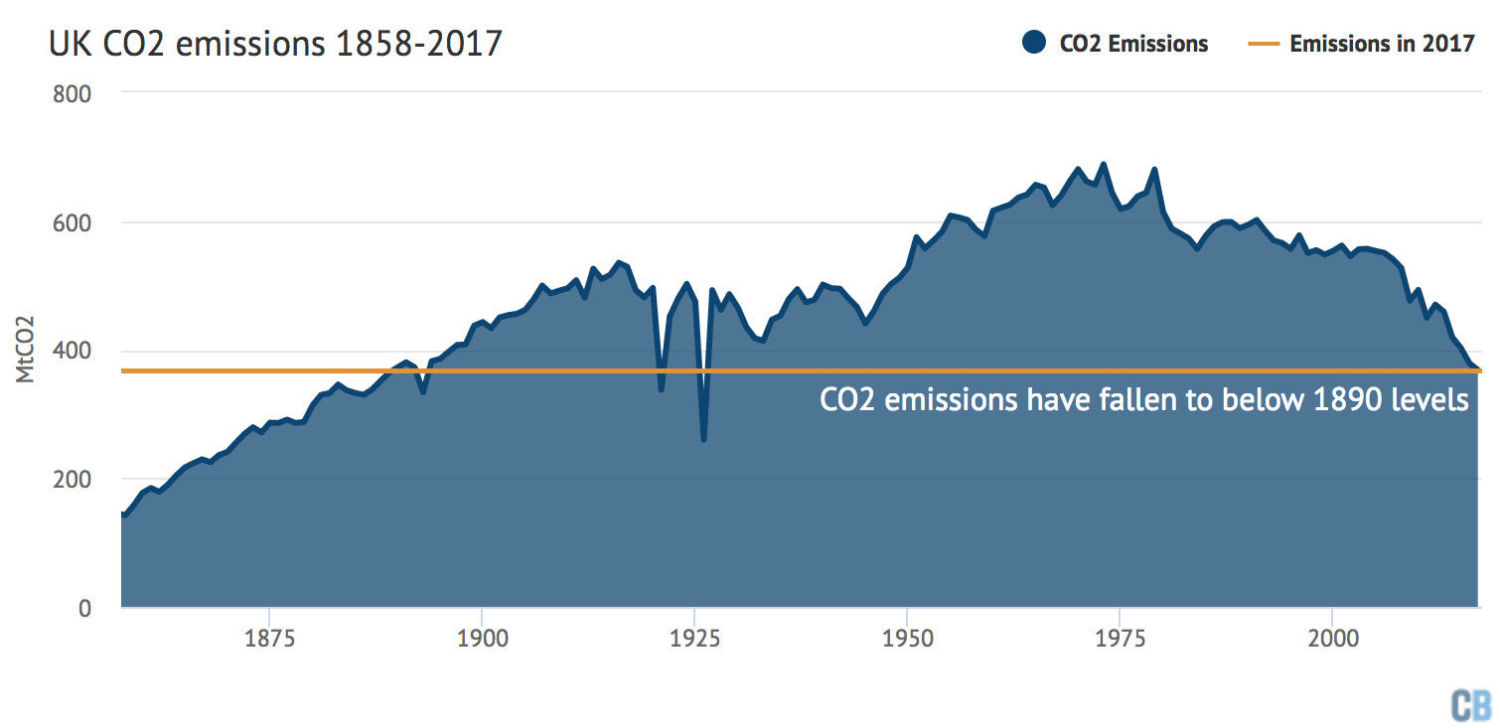
In addition to not acknowledging the good progress so far made, the climate protests themselves are somewhat misdirected. It is a simple fact that when it comes to emissions, the UK is a small player. On the global stage, the UK’s emissions are small enough as to be rendered insignificant.
Quite simply, the climate activists are protesting in the wrong country, and against the wrong government.
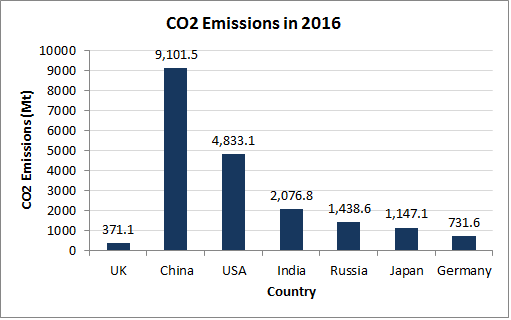
According to data from the International Energy Agency (IEA), the world emitted 32,316.2 Mt of CO2 in 2016, with the UK making up 371.1 Mt of the total (just over 1%). The UK has reduced its emissions consistently for decades, however these decreases are eliminated by emissions growth in other countries. From 1990 – 2016, global CO2 emissions rose on average by 453 Mt per year – an annual rise of the UK’s total emissions plus an additional 25%.
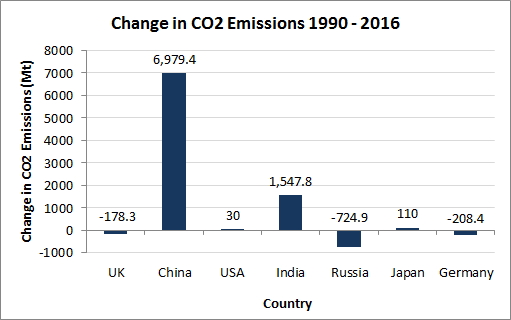
The chart above demonstrates the utter futility of the UK’s efforts. The UK leading by example in emissions reduction does not seem to be influencing other major emitters to follow suit.
From 1990 – 2017, UK greenhouse gas emissions fell by 43%, and CO2 emissions by 38%. The biggest contribution to the fall in emissions has been from energy supply (including power generation), where coal energy sources have been largely phased out. The UK only has 7 operational coal power stations left, with the last one being commissioned in 1987. The UK aims to close all coal power stations by 2025, and has embarked on an ambitious renewables strategy, in which offshore wind energy will provide a third of total energy requirements.
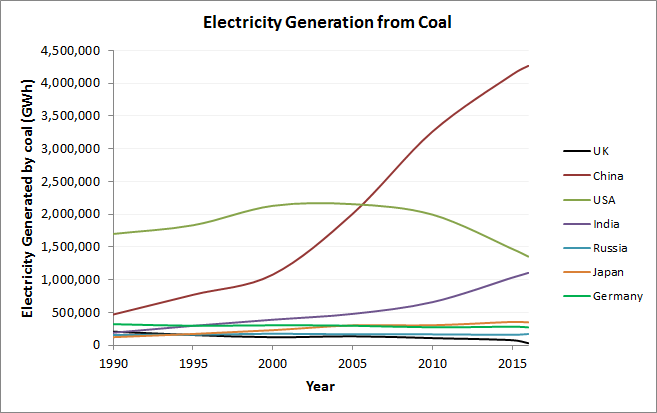
India and China in particular continue to build coal-fired power stations at a high rate. In 1990, electricity generated from coal in the UK totalled 206,438 GWh. In 2016, that had fallen to 31,481 GWh, a fall of over 84%. Over the same time period, the amount of electricity generated from coal sources in China had risen by over 808% (from 469,762 GWh to 4,266,555 GWh) and in India by over 476% (191,633 GWh to 1,104,828 GWh).
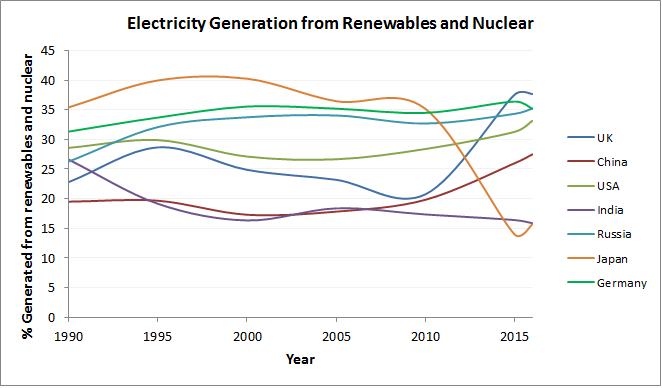
Renewables and nuclear energy uptake has also been slow but generally positive from all the top emitters except from in Japan (Japan shut down much of its nuclear production capacity after the Fukushima Daiichi nuclear disaster), and India. Since 2010, the UK has increased renewables usage dramatically, and has become the global leader in offshore wind power. In 2018, the UK had 8,422 MW of offshore wind capacity, just under a third of the global total.
Although the UK has taken action over the last few decades, it is true that the British government could do more to curb emissions. However it is also clear that the UK will not solve any climate issues on its own. On a global scale, UK action without coordinated emissions reduction from the largest emitters is largely futile.
Note: In this article, total emissions have been used rather than emissions per capita, or emissions per unit of GDP. This is because it is the absolute volume of CO2 which is relevant to man-made climate change. Therefore small countries with a high emissions per capita (such as Australia and Canada) still have a negligible effect on global processes, and can themselves do little to affect global emissions.
This post was originally published by the author on his personal blog:
https://joelrwrites.wordpress.com/2019/04/18/the-demands-of-london-climate-activists-will-not-solve-the-problem/
 Daily Globe British Values, Global Perspective
Daily Globe British Values, Global Perspective




Excellent Joel. Good to read the truth about CO2 emissions and climate change. I’m most certainly all for ensuring the world is better today than it was yesterday, and there is more we can do, but in many cases, we can actually make the environment WORSE through environmental legislation:
If we make it so hard for companies to manufacture in the UK, they move to China, where there are no regulations and the footprint/product increases exponentially.
I can’t help but think that Extinction Rebellion could do much worse than to protest outside of the PRC’s embassy. That’s where the real systematic destruction of nearly every human or environmental right is occurring…
Great article!
The shift in manufacturing from Europe to India and China is a major reason for the Europeans appearing so environmentally holy.